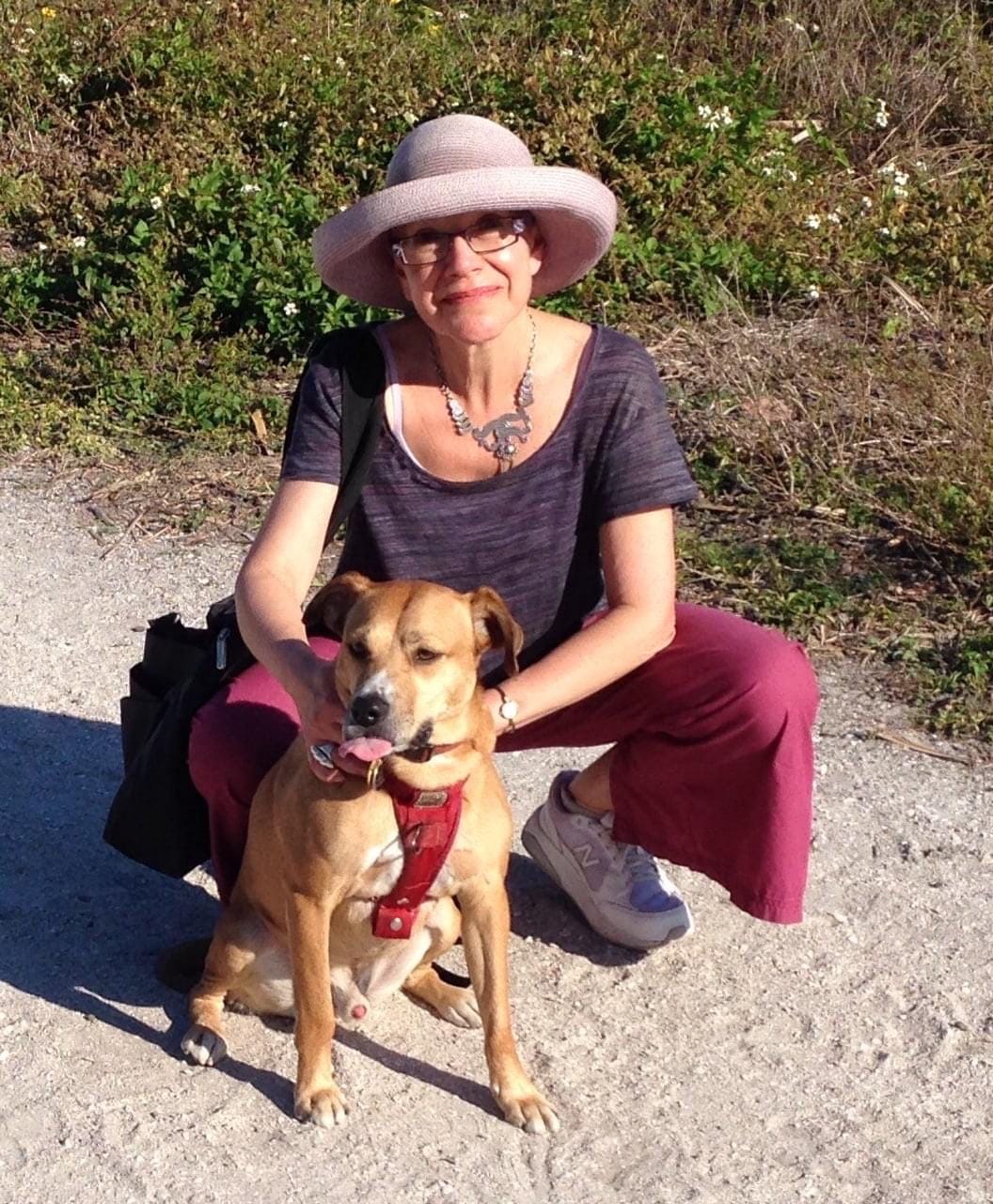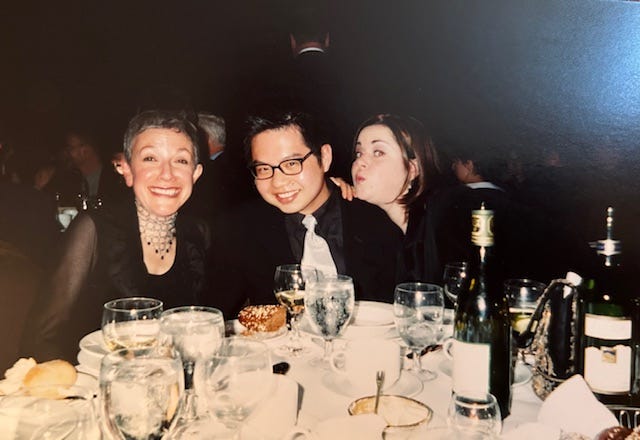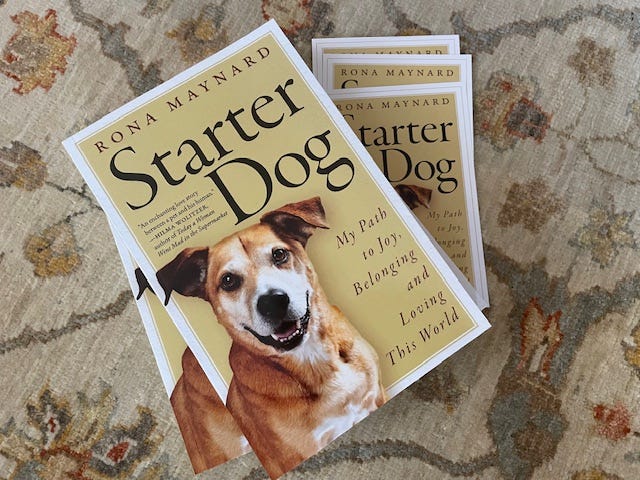My Canine Life Coach
When I left my Important job, I lost my place in the world. Then I started walking a dog--and found what really matters.

Welcome, friends. How quickly you’ve become part of my life. Twenty posts along, I think of you while shaping the next one. You’re a fast-growing tribe, which pleases me, but the real amazement can’t be plotted on a graph. It’s your perceptions, your encouragement, the glimpses you’ve shared of your lives.
If you like what you’ve been reading here so far, I think you’ll connect with my new memoir Starter Dog: My Path to Joy, Belonging and Loving This World, excerpted in today’s post. Not a dog person? Bear with me. The dog—my first, rescued when my husband and I were 65—drew me into the astonishments of growing older. P.S. to dog folk: The doggie doesn’t die. He’s snoring as I write. Let’s go…
When you dress for a dog, it doesn’t matter what you wear. Too-cool-for-drool Capri pants hung untouched, all shoes without rubber soles had been kicked to the back of the closet. My sensible nylon purse held a nub of a lipstick once in a while and a roll of poop bags without fail. But to dine with sister members at the signature conference of a Very Important Association, I dusted off a tangerine silk jacket and found some mascara not yet dried out. This group didn’t take fashion lightly. There would be Prada, Manolos and serious jewelry. For the first time in memory, I had treat crumbs nowhere on my person.
The Very Important Association had grandmothered me. They don’t recruit women whose most consequential meeting of the day is with their dog. They seek the connected and esteemed.
At a candlelit table overlooking the Boston skyline, dressed as someone I used to be, I took my place among a coterie of women at the peak of their change-making powers. One by one, each woman recounted her milestone of the year: a vision realized against the odds, a lifelong passion repurposed as a lucrative career. They dazzled me, these women. How bold they were, how tenacious. In their spare time they sat on boards, advised candidates for office, launched charities to do what had never been done.
The Boston skyline twinkled. A server bent to refill my glass. What milestone could I share? I’d been ambling around with Casey in jeans and scuffed hiking boots. Our daily outing produced a bag of poop and two happy walkers. My turn had come to speak. “My husband and I got a dog. He’s transformed our lives.”
The women whipped out their phones. Heads bent, fingers flew. A dog! Where would we be without our dogs? Round the table went the phones, each one displaying a photo of someone’s little monkey. I fumbled for a shot of Casey—any shot at all would do—while exclaiming at the Yorkie in a Christmas sweater and the Lab snuggling with a grandchild. At last I found Casey surveying our favorite park—paws on a bench, nose uplifted for a scent. I’d caught him in a rare moment of what looks to human eyes like nobility. But the conversation had moved on. I slipped the phone back into my purse.
When news broke that I was leaving my job as editor of Canada’s leading magazine for women, my friend Audrey called to let me know I’d regret it. “So how does it feel to be finished with the most important thing you’ll ever do?”
My grip tightened on the receiver. “Who says I’m through with important things? I’m not even 55 yet. It’s time to surprise myself.”
I might as well have told her I’d enrolled in clown school. “Look, have you realized how tough this transition will be? You’re used to being a Very Important Person. The day you walk out of your office is the day a lot of people stop returning your call. And I don’t think you’re going to like being Formerly Important.”

I’d grown accustomed to Importance. My job preceded me into cocktail receptions, exuding the aura that eclipsed the private me. Strangers thought they already knew me from my airbrushed photo at the front of Chatelaine, my smile at the elusive midpoint between welcoming and folksy. “I love your column!” they’d say, clasping my hand. Being the center of attention seemed at first like an odd deviation from my natural place on the margins, I felt certain it would never turn my head. Then constant reminders of Importance chipped away at my resolve. New ones landed on my desk every day in the form of gilt-edged invitations to swanky parties. The most memorable of these—on the heaviest vellum, with multiple layers of envelope—had to be disassembled, not simply opened. The Queen was coming to Toronto. I’d been summoned to the state dinner.
I thought I’d received a rare honor—until I realized that the guest list included some 700 local worthies. An acquaintance of mine got a call from an ever-so-formal gentleman who introduced himself as the Queen’s protocol officer, with instructions on how she should dress. The woman grabbed a pen: blue shoes, square black purse, triple strand of pearls. And the finishing touch: a pin in the shape of a Corgi. She suddenly remembered it was April 1. A prankster friend was having her on. I don’t mean to make fun of this woman. The truth is, I too had been obsessing over my outfit. (Was the black jersey too somber? The purple velvet too ostentatious?) “I can’t believe you’re in a tizzy over this,” said my husband. He too was on the guest list but recognized a corporate duty call. The perception of Importance had unraveled me.
Flying home from Boston, I slipped into a reverie. I saw myself at the enormous desk of my Very Important years. Behind me, the Toronto skyline at dusk, every pinprick of light an office where people strove to make partner, make the numbers, make “the next level.” Before me, perched on a narrow-backed chair, a young editor named Annie. She had drive, talent, everything it would take to land a job like mine one day. Without any warning, she’d just given notice. She was following her fiancé to northern Ontario, where he’d found work as a wildlife biologist. Okay, so she loved him. The sticking point was northern Ontario. Didn’t we have plenty of wildlife in downtown Toronto, ripping into the garbage every night with eager paws? What would Annie do in Nowheresville? What if the marriage broke up, leaving her with no job or recent work experience? Surely I could talk her out of this.
The plane banked above Toronto. Below me I could make out the the downtown streets I used to glide though in a cab, on my way to nibble smoked salmon canapés with people who seemed important at the time. I’d forgotten most of that crowd but could still picture Annie, looking like a child hauled into the principal’s office—head lowered, hands twisting in her lap as I launched into my notion of a heart-to-heart: You can go anywhere you want in this business, but the next few years will be critical. You’ll have lots of opportunities here. Don’t throw your future away.
Rewinding the scene, I couldn’t make out one word from Annie. How could it be otherwise? I hadn’t listened at the time. When tears welled up in Annie’s eyes, I thought she’d come to her senses. More likely she wept because much as she’d relished her job, she felt the tug of another way of life. I hadn’t acknowledged her pain. Perhaps even worse, I’d sent the clear message that the life she was choosing didn’t matter half as much as the one she could have by following my example.
Annie went off to northern Ontario and set up shop as a freelance writer. She didn’t want a career like mine; she wanted time for hiking and canoeing. She wanted open spaces for her kids to explore. And as it turned out, she wasn’t ditching any opportunities. By the time I fell out of love with my job, the public was falling out of love with magazines. Everything I’d built at work was about to morph into something else or vanish entirely. The mission statements and strategic plans went into a big yellow dumpster. I tossed them in myself, like handfuls of earth into the grave of who I used to be. I had relished most of my time in that office, but how important was it in the grand scheme of things? Why should casting a line into a river with your child matter less than presenting at the sales conference?
Your turn now. Any thoughts to share on the transition known as retirement? (I prefer the term “discovery years,” which doesn’t sound so…well, retiring.) How have you learned to distinguish what matters from what’s expected—or are you still working it out? If these questions don’t appeal, feel free to chime in with whatever strikes you. Dogs, working life, saying no to your boss as Annie did… This is your conversation, and that’s exactly how I like it.






As one doggish writer to another, thanks for restacking.
Retired now for 7 years. I took to it like a dog to water (mine's a labrador 😊) despite having a Very Important Job, but no fame. I was an English teacher and loved my job with a passion. I thought I would miss the buzz of teenage angst and discovery but no - my time had come. I've learnt to sail and got my Skipper's ticket; gone up the Amazon and over to the Galapagos; and got myself a puppy. I've always had dogs but always adult rescue dogs. I had promised myself a pup to train when I retired. Rescue dogs often confront you with other people's dog-rearing mistakes. Sula, the fox red labrador, was a handful but is now my best friend and one of the most empathic beings I have ever met. No wonder labs are guide dogs. We have had considerable family trauma in the last few years and she is there for everyone in the family with her unquestioning love and kindness.